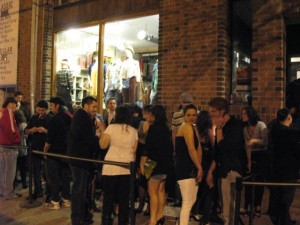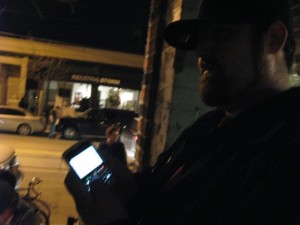
Neighbourhood residents have complained about The Social's crowded sidewalks. Beth Macdonell/Gleaner News
By Beth Macdonell
In what seems to be a response to the city issuing an increased number of fines last year, Richard Lambert, co-owner of The Social (1100 Queen St. W.), is asking the city to rezone the address to allow it to operate as a nightclub.
The Social previously operated under a restaurant license, as nearly all bars in the city do.
Between January 2009 and November 2009, The Social was ticketed for violating their operating licence eight times, Bruce Robertson, manager of Toronto’s Municipal Licensing and Standards Division (MLS). For their first offence, The Social received a $250 fine. Robertson said the other violations will be heard in court September 10.
In fact, Robertson said The Social has been operating without a valid license since November, “essentially” open illegally for business. He said The Social did not reapply for its yearly license. Robertson said the city was likely waiting for the accumulated violations to be processed before they took further action, adding that this sort of thing was not usual.
City Planning confirmed the applicant submitted a rezoning request January 13, 2010. Staff said apart from the Entertainment District, there are few addresses in the City of Toronto granted a license to operate as a club.
Lambert turned down several phone, email and in-person interview requests with the Gleaner. On one attempt, he bursted out, “Oh, it’s the Gleaner girl,” and instructed his staff not to speak with the newspaper. Phone calls to the applicant’s lawyer were not returned.
A big part of the problems stems from the fact that there is no such thing as a bar license in the city of Toronto. Businesses can apply for licenses as restaurants or entertainment facilities. Restaurants are obligated to have a certain number of tables and chairs, have limited “dance floor” space, and serve food.
If The Social were to be approved for the change in license and be allowed to operate as a night club, “they would face stricter requirements”, said Toronto city planner Jamaica Hewston. Among other things, Hewston said the new license would require The Social to set up a metal detector.
Residents fear if the re-zoning request is granted, a precedent for other clubs to open in the area will be set. Hewston confirmed that fear at a community meeting held April 19. “Ultimately we do have to think of the use of the building, if Richard leaves in ten to twenty years, the use would still be the same,” said Hewston.
Similarly, she said if the city allowed The Social to be a club, other establishments could reference the decision as argument to also rezone as an entertainment establishment.
“The problem is that there are too many people partying in the neighbourhood”, said Misha Glouberman, founding member of the Queen Beaconsfield Residents Association. Glouberman said the group opposes the expansion of bars in general, so this is not just about The Social. “The biggest problem I have is trying to sleep.”
Hewston said the city wants to give licenses to new restaurants along the West Queen West strip to help diversity the neighbourhood, but said they never know when one of the ‘restaurants’ actually intend to run the business as a late night bar. “We don’t want to refuse restaurants from opening,” Hewston said.
“It’s not simple, unfortunately,” said Lambert at the meeting. When The Social opened, it operated as a restaurant, he said. “You can’t always control people and the direction.”

Morgan Taylor, head of security for The Social, texts staff to turn music down and lights on at 2:45 a.m. Beth Macdonell/Gleaner News
Lambert said The Social was totally unaware they were violating their operating license until two years ago. He said if The Social were to shut down, 30 people would lose their jobs, having a negative impact on the community.
When city staff asked at the meeting why The Social would not comply with the current rules until decision was reached, Lambert said he was “not at liberty to discuss the inner workings of my business.”
A lot of residents said they did not know if he would show up to the meeting, but he stayedfor the entire duration, cordially answering questions and addressing concerns. Many residents thanked Lambert for his openness during the meeting.
Several residents said the lack of enforcement by the city was the root of the wider problem along the Queen West strip, namely the level of noise at night and the number of what are in reality bars, but designated as restaurants operating.
“There is no overnight solution, said Joe Magalhaes, District Supervisor of MLS at the meeting. He said the licensing department was bound by the courts and has to wait for violations to be heard, a process he pointed out which can take months, sometimes years. “But I don’t want people to think we are not actively investigating.”
“I know there is a lot of frustration”, said Councillor Adam Giambrone (Ward 18, Davenport), also present at the meeting. He was sympathetic to the length of the court process for establishments caught violating their licenses. He said he planned to support the refusal of The Social’s re-zoning request.
“We would like to see a variety of small businesses open up,” wrote Michelle Gay, an artist who has lived and worked in the West Queen West neighbourhood for 13 years in an email to the Gleaner. “It’s meaningless for us to have bars move into the neighbourhood and remain closed until 9 p.m. It doesn’t create an interesting and vibrant place to live.”
Hewston said the city planning department is writing a report which will be presented to community council May 25. City council will then vote on The Social’s request in early June. If the request is declined, Lambert can appeal the decision to the Ontario Municipal Board.
